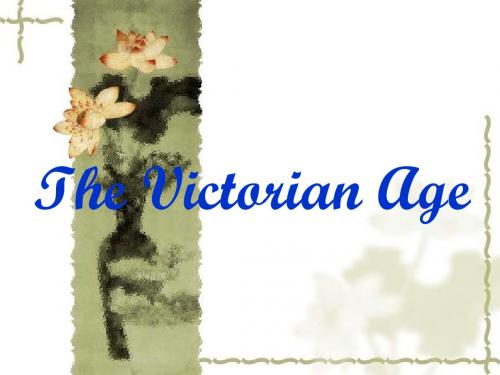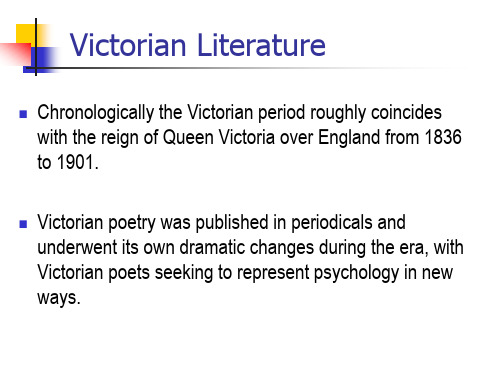1 英国文学简史第十一章 Victorian period re s
- 格式:ppt
- 大小:411.00 KB
- 文档页数:75




盎格鲁撒克逊时代426—1066盎格鲁诺曼时代1066—1350Chaucder乔叟时代 1350—1485莎士比亚时代1564—1636清教徒时代 Puritan 1636—1660古典主义时代 1660—1744约翰逊时代 1744—1785浪漫主义时代1786—1832维多利亚时代 1832—1900现代第一章Anglo-Saxon (426—1066)旧约:上帝创世纪新约:耶稣古英语诗歌分为的世俗的1.Beowulf 史诗(三千行的长诗,关于英雄战绩的故事)2.文字来源于日耳曼系3.基督教的文学:瑞特文的故事Caedmon第二章Angol-Norman(1066—1350)中世纪英语:基督教义,自我拯救1.传奇文学---传奇的兴起Romances1)容:传奇好像现在的长篇,有诗,有散文唯一的描写古代的高贵的英雄所经历的冒险生活和恋爱故事。
2)产生:传奇文学完全是由中世纪的“骑士制度”(Chivalry)所产生的,骑士制度的精神产物就是传奇文学所以他们和平民丝毫没有关系,且平民也绝写不出这一类的文字。
3)分类:不列颠的事迹 the matter of Britain法国的事迹罗马的事迹第三章:乔叟的时代(1350—1458)背景:百年战争(The Hundred’s War)1.Geoffrey Chaucer:文艺复兴以前,英国文学界最伟大的人物。
The Canterbury Tales1)三个阶段:第一时期--早年—模仿法国简短的情歌和寓言第二时期—研究意大利文艺的时期第三时期—在文学上成功的时期,为他自己以国文写作的时期2).近代诗人英文作家中,第一个以浪漫作风写男女日常生活的人3).特点:反对迫害,反对禁欲,文艺复兴的报春者a他在英语上发明音调b他把英国中部的日常言语加以修改,以告成英文与英国文学。
c完美的音律,倾向于音乐化d 创设接近社会生活的作品;眼光思想都很广阔;音乐的眼光第四章:民间文学1.歌谣的来源:歌德Geothe说:民歌的价值,全在直接从“自然“中得到它的原动力。

英国文学简史英美文学史名词翻译Neoclassicism (新古典主义) Renaissance (文艺复兴)Metaphysical poetry (玄学派诗歌)Classism (古典主义)Enlightenment (启蒙运动) Romanticism (浪漫主义)Byronic Hero (拜伦式英雄)Aestheticism(美学主义)Stream of consciousness (意识流)the Age of Realism (现实主义时期) Naturalism (自然主义)Local Colorist (乡土文学)Imagism (意象主义) The Lost Generation (迷惘的一代)Surrealism (超现实主义) The Beat Generation (垮掉的一代)Metaphysical poets (玄学派诗人)New Criticism (新批评主义)Feminism(女权主义) Hemingway Code Hero (海明威式英雄)Impressionism (印象主义) Post modernity (后现代主义)Realism (现实主义)Allegory (寓言)Romance (传奇)epic(史诗)Blank Verse (无韵诗)Essay (随笔)Masques or Masks (假面剧)Spenserian Stanza (斯宾塞诗节)Three Unities (三一。
原则)Meter (格律)Soliloquy (独白) Cavalier poets (骑士派诗人)Elegy (挽歌). Action/plot (情节)Atmosphere (基调) Epigram (警句)The Heroic Couplet (英雄对偶句)Sentimentalism (感伤主义文学)Aside (旁白)Denouement (戏剧结局)parable (寓言)Genre (流派)Irony (反讽)Satire (讽刺)Lyric (抒情诗)Ode (颂歌)Pastoral (田园诗) Canto (诗章)Lake Poets (湖畔诗人) Image (意象)Dramatic monologue(戏剧独白)Psychological novel (心理小说)Allusion (典故) Protagonist and Antagonist (正面人物与反面人物) Symbolism (象征主义) Existentialism (存在主义)Anti—hero (反面人物)Rhyme (押韵)Round Character (丰满的人物)Flat character (平淡的人物)Oedipus complex (俄狄浦斯情结/蛮母厌父情结) Iambic pentameter (抑扬格五音步)Poetic license (诗的破格) Legend (传说)Myth (神话) Pessimism (悲观主义)Tragicomedy (悲喜剧)Comedy of manners (风俗喜剧)Free Verse (自由体诗歌) Magic realism (魔幻现实主义) Autobiography (自传) Biography (传记)Foot (脚注)Protagonist (正面人物)Psychological Realism (心理现实主义) Setting (背景)Chronicle《编年史》Ballads 民谣consonant(协调,一致) repetition (反复)repeated initial(开头的)一、中世纪文学(约5世纪—1485)•《贝奥武甫》(Beowulf)•《高文爵士和绿衣骑士》(Sir Gawain and the Green Knight )杰弗利·乔叟(Geoffrey Chaucer)―英国诗歌之父(Father of English Poetry)《坎特伯雷故事》(The Canterbury Tales )二、文艺复兴时期文学(15世纪后期—17世纪初)•托马斯·莫尔(Thomas More )《乌托邦》(Utopia)•埃德蒙·斯宾塞(Edmund Spenser)《仙后》(The Faerie Queene)•弗兰西斯·培根(Francis Bacon)《论说文集》(Essays)•克里斯托弗·马洛(Christopher Marlowe)《帖木儿大帝》(Tamburlaine)《浮士德博士的悲剧》(The Tragical History of the Life and Death of Dr。

I. Old English Literature & the Late Medieval Ages<Beowulf>贝奥武夫:the national epic of the Anglo-SaxonsGeoffrey Chaucer 杰弗里•乔叟1340(?)~1400The father of English poetry.①<The Canterbury Tales>坎特伯雷故事集:first time to use ‘heroic couplet’(双韵体) by middle English②<Troilus and Criseyde>特罗伊拉斯和克莱希德③ <The House of Fame>声誉之宫II The Renaissance PeriodA period of drama and poetry. The Elizabethan drama is the real mainstreamof the English Renaissance.Renaissance: the activity, spirit, or time of the great revival of art, literature, and learning in Europe beginning in the 14th century and extending to the 17th century, marking the transition from the medieval to the modern world.Three historical events of the Renaissance – rebirth or revival:1.new discoveries in geography and astrology2.the religious reformation and economic expansion3.rediscovery of ancient Roman and Greek cultureThe most famous dramatists:Christopher MarloweWilliam ShakespeareBen Johnson.William Shakespeare威廉•莎士比亚1564~1616①Historical plays:Henry VI 亨利六世; Henry IV : Richard III 查理三世; Henry V ;Richard II;Henry VIII②Four Comedies: <As You Like It>皆大欢喜; <Twelfth Night>第十二夜;< A Midsummer Night’S Dream>仲夏夜之梦;<Merchant Of Venice>威尼斯商人③Four Tragedies: <Hamlet>哈姆莱特; <Othello>奥赛罗;<King Lear>李尔王; <Macbeth>麦克白④Shakespeare Sonnet :154 <The Sonnets>Three quatrain and one couplet, ababcdcdefefggA sonnet is a lyric consisting of 14 lines, usually iniambic pentameter restricted to a definition rhyme scheme.⑤the comedy of errors 错中错,Titus Andronicus泰特斯·安特洛尼克斯,The Taming of the shrew 驯悍记Love's labour's lost (爱的徒劳)Romeo and Juliet 罗密欧与朱丽叶Much ado about nothing(无事生非)The merry wives of Windsor. 温莎的风流娘们King John 约翰王All's well that ends well 终成眷属Measure for measure(一报还一报)Bacon: Of Studies;Of Beauty; Of Marriage and Single Life EnglishBourgeois Revolution,<The Advancement of Learning>学术的推进III:the period of the English bourgeois revolution.Milton:1608~1674Paradise Lost; Samson Agonistes (力士参孙);On the morning of Christ’s Nativity,<Paradise Regained>复乐园<On His Blindness>我的失明<Areopagitica>论出版自由<The Defence of the English People>为英国人民声辩Bunyan: 1628~1688①Religionary Allegory:<The Pilgrim’s Progress>天路历程Grace Abounding to the Chief of Sinner;the Holy WarJohn Don: the Metaphysical poet(玄学派诗人).Metaphysical Poetry(玄学诗):(用语)the diction is simple, the imagery is from the actual, (形式)the form is frequently an argument with the poet’s beloved, with god, or with himself.(主题:love, religious, thought)The Flea; 跳蚤Forbbiding Mourning,Songs And Sonnets歌与十四行诗,emergent occasions 突变引起的诚念Hely sonnetsIV The 18th Century:EnlightenmentA revival of interest in the old classical works, order, logic, restrained emotion(抑制情感) and accuracyThe Age of Enlightenment/Reason:the movement was a furtherance of the Renaissance of the 15th and 16th centries, a progressive intellectual movement, reason(rationality), equality&science(the 18th century)小说崛起:In the mid-century, the newly literary form, modern English novel rised(realistic novel现实主义小说)Gothic novel(哥特式小说):mystery, horror, castles(from middle part to the end of century)Jonathan Swift乔纳森•斯威夫特1667~1745(十八世纪杰出的政论家和讽刺小说家a master satirist。
(一)The Victorian Age⏹General Introductiona)Period an Eras in English historyAnglo-Saxon655–1066Norman1066–1154Plantagenet1154–1485Tudor1485–1603Elizabethan1558–1603Stuart1603–1714Jacobean1603–1625Caroline1625–1649Interregnum1649–1660Restoration1660–1688Georgian1714–1830Victorian1837–1901Edwardian1901–1910World War I1914–1918Interwar1918–1939World War II1939–1945Modern1945–present⏹Brief intro:The Victorian Period revolves around the political career of Queen Victoria. She was crowned in 1837 and died in 1901 (which put a definite end to her political career). A great deal of change took place during this period--brought about because of the Industrial Revolution; so it's not surprising that the literature of the period is often concerned with social reform. As Thomas Carlyle (1795-1881) wrote, "The time for levity, insincerity, and idle babble and play-acting, in all kinds, is gone by; it is a serious, grave time."b)Victoria Period1)Time Span⏹The Victorian Period revolves around the political career of Queen Victoria.⏹ A new era really began with the passage of Reform Bill 1832 and closed at the end ofBoer War in 1902.2)Three phases⏹The early Victorian period (1830~48): 多事之秋(A Time of Troubles)It saw the opening of Britain’s first railway and its first Reform Parliament, but it wasalso a time of economic distress.⏹The mid-Victorian period (1848~70): 经济繁荣和宗教分歧的时期(EconomicProsperity and Religious Controversy)It was not free of harassing problems, it was a time of prosperity, optimism, andstability.⏹The later period (1870~1901) : 由盛到衰过程的时期(Decay of Victorian Values)The costs of Empire became increasingly apparent, and England was confronted withgrowing threats to its military and economic preeminence.c)Queen Victoria and Victorian Temper⏹Victoria was born in 1819.She came to the throne in 1837(aged 18), after the death ofher uncle William IV, crowned in 1838 and died in 1901.⏹She reigned for exactly 63 years, 7 months, 2 days (June 20, 1837 - January 22, 1901),longer than any other British monarch.⏹Her 9 children and 42 grandchildren tying them together and earning her the nickname"the grandmother of Europe".⏹Exemplifies Victorian qualities: earnestness, moral responsibility, domestic propriety⏹The Victorian Period was an age of transition⏹An age characterized by energy and high moral purpose1819年生于伦敦,1837年继位成为英国女王。